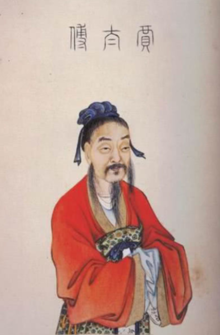
Back جیا یی CKB Jia Yi German Jia Yi French Jia Yi Croatian Csia Ji Hungarian Jia Yi ID Jia Yi Italian 賈誼 Japanese 가의 (전한) Korean Jia Yi Dutch
| Jia Yi | |||||||||||||||||||||||||||||||||
|---|---|---|---|---|---|---|---|---|---|---|---|---|---|---|---|---|---|---|---|---|---|---|---|---|---|---|---|---|---|---|---|---|---|
 18th century depiction of Jia Yi | |||||||||||||||||||||||||||||||||
| Traditional Chinese | 賈誼 | ||||||||||||||||||||||||||||||||
| Simplified Chinese | 贾谊 | ||||||||||||||||||||||||||||||||
| |||||||||||||||||||||||||||||||||
| Alternative Chinese name | |||||||||||||||||||||||||||||||||
| Traditional Chinese | 賈生 | ||||||||||||||||||||||||||||||||
| Simplified Chinese | 贾生 | ||||||||||||||||||||||||||||||||
| Literal meaning | "Scholar Jia" | ||||||||||||||||||||||||||||||||
| |||||||||||||||||||||||||||||||||
Jia Yi (Wade–Giles: Chia I; c. 200 – 169 BCE) was a Chinese essayist, poet and politician of the Western Han dynasty, best known as one of the earliest known writers of fu rhapsody and for his essay "Disquisition Finding Fault with Qin" (Guò Qín Lùn 過秦論), which criticises the Qin dynasty and describes Jia's opinions on the reasons for its collapse. In particular, he is famous for his two fu, On the Owl (鵩鳥賦) and his Lament for Qu Yuan (吊屈原賦), and is author of the treatise Xinshu (新書), containing political and educational insights.[1] The Book of Han's Journal on Literature attributes thirty eight writings to him.[2]
© MMXXIII Rich X Search. We shall prevail. All rights reserved. Rich X Search